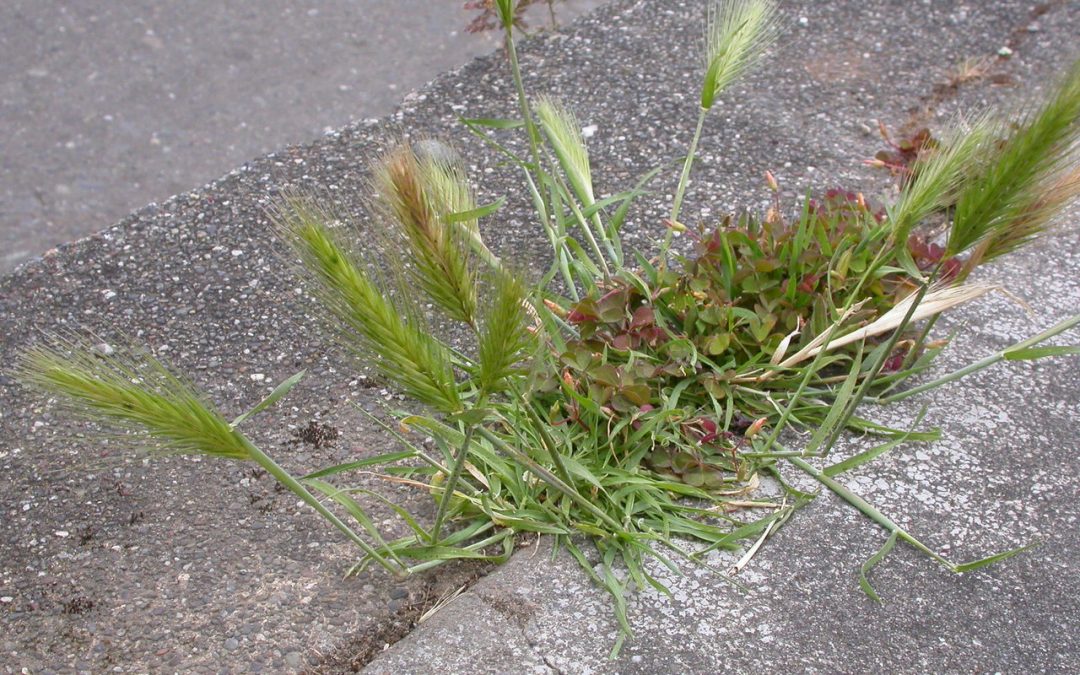Maybe you got a nasty notice from the homeowners association. Or maybe you spent the weekend weeding, only to come home and find grass or dandelions poking up between your pavers or the cracks of your sidewalk. They’re unsightly and can cause serious damage to your walkway.
Before you reach for the spray bottle of Roundup or some other toxic weed killer containing glyphosate, take a look in your kitchen. You may already have all the ingredients to kill weeds and grass in driveway cracks. Homemade solutions are both cheap and eco-friendly.
Let’s start with why grass and weeds are attracted to sidewalk cracks. The cracks and crevices look small, but the spaces between pavers hold an amazing amount of dirt and organic matter. This matter gets swept by wind and rain and snow. Those crevices also hold onto moisture a little longer than flat surfaces, so it’s a perfect incubator for the weed seeds or grass.
The setup also gives grass and weeds a little protection from you. It’s tough to get to the grass roots, or taproots of the weeds when all you can do is try to pull the unwanted plants by their tops. And you’re not likely to mulch those areas, as you would your flower beds, to prevent a return. But you can find everything you need to get to the root of the problem, in your kitchen — without turning to chemical herbicides sold at the garden center.
The good news is that because the unwanted intruders are in driveway or sidewalk cracks, you don’t need to be as precise when applying your homemade remedies. A poorly aimed squirt has less of a chance to hit and accidentally kill desirable plants.
6 DIY methods to get rid of weeds and grass in driveway cracks
- Pour boiling water on the cracks.
- Kill them with a mixture of dish soap and white vinegar.
- Sprinkle baking soda or salt on the weeds.
- Douse the cracks and crevices with bleach.
- Dig the weeds out with ice pick or screwdriver.
- Seal the cracks to prevent weeds from returning.
First, a word of warning: These common kitchen ingredients aren’t toxic in small doses, but they’re not benign, either. “Several can be harmful to people/pets during mixing and application, owing to inhalation, skin or eye contact, or spray mist. Some have unpleasant smells or have an allergenic effect,” writes Deborah Smith-Fiola and Stanton Gill for the University of Maryland Extension. Some hazards are obvious: Boiling water can burn you if you are not careful with it. Others aren’t as obvious. Don’t take chances and handle all of them carefully.
Details and cautions
- Pour boiling water on the weeds or unwanted grass. The hot water will kill the plants quickly. This method is guaranteed to kill just about any plant, and it’s great if you need a quick fix. The con: boiling water doesn’t prevent the weeds or grass from coming back.
- Fill a sprayer with white vinegar and add a little dish soap. The soap allows the vinegar, also known as acetic acid, to stick to the weeds, killing them. The con: the vinegar in your kitchen may not be strong enough, depending on the kind of weeds or grass you’re fighting. You can also use vinegar that is designated as an herbicide. Horticultural vinegar is about 20% acid, and much stronger than white vinegar. Horticultural vinegar is especially useful in killing small, young broadleaf weeds, like plantain. Crabgrass is also vulnerable to horticultural vinegar. Do NOT allow the vinegar to come in contact with your lawn or plants. It will kill all the greenery.
- For a more permanent weed solution, mix a gallon of white vinegar with two cups of table salt and spray on weeds and grass in the driveway cracks. It may take more than one application, but eventually, a cup of salt or two will stop the weeds from coming back. The con: Salt can change the salinity of your soil, which could have an impact on the rest of your yard.
- Dump baking soda on to the crack weeds and grass. Follow up with a good soaking with the hose to help the baking soda target the roots. Do it again in a couple of weeks if the problem isn’t gone. The con: Baking soda also increases the salinity of the soil.
The pros of homemade weed killers are that yes, they do provide some level of weed control, without the environmental or health risks that toxic chemicals can leave behind. That’s more peace of mind for parents, pet owners, and for people who care about the environment. It also gives you more control over your weed problem, killing those stubborn grasses and new weeds that seem to pop up all too often in the driveway cracks and crevices of your hardscaping. If you apply natural weed killer enough and at the right time, you may finally be free of those pesky plants that ruin the look of your yard.
Image credit: “Hordeum leporinum,” by Matt Lavin, CC by SA 2.0

